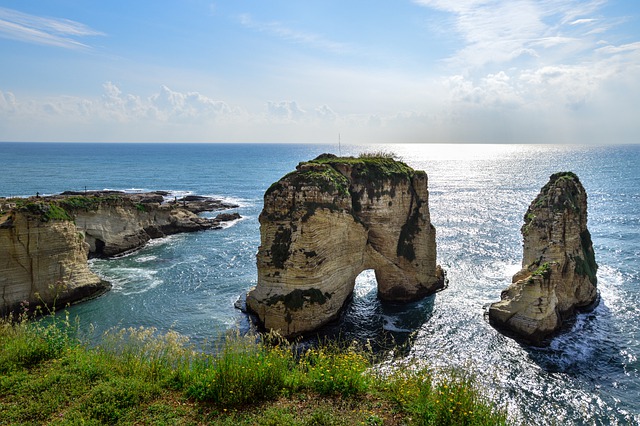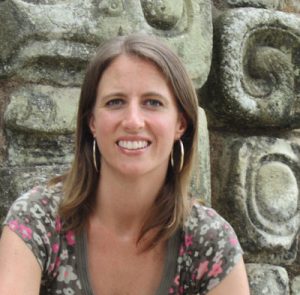 Amy E. Robertson on Volunteering around Latin America
Amy E. Robertson on Volunteering around Latin America
Today we meet Amy who has just published her latest book about volunteer vacations in Latin America, an expat herself she’s currently living with her husband and two children in Beruit.
1. It seems you’ve traveled quite a bit, where has been your favorite place to live?
For me, that question is like being asked to choose which child is your favorite! I love different things about each place.
My expat friends and I have been having this conversation lately, realizing that there you can always find great things about anywhere you live, and you’ll always miss things that were great in other places. I love the great weather in Beirut (where I currently reside) and its virtual absence of petty crime. In Honduras I loved being able to swim in the Caribbean, in Ecuador I loved the rich indigenous culture, in Spain I loved the sassy attitude and great food, in London I loved the wealth of public spaces – from parks to museums to historic streets and squares. I can’t pick a favorite!
2. How often do you take volunteer vacations these days? Which has been your favorite volunteer vacation?
I think a lot of people will relate when I say that it can be hard to carve out time for a volunteer vacation – which is why my book Volunteer Vacations in Latin America includes a number of opportunities that require just a short time commitment and can be integrated into a vacation you already have planned. My latest volunteer adventure was just a day trip – taking food and clothing to be distributed to Syrian refugees in southern Lebanon. I traveled less than an hour from my apartment in Beirut, but it was like I had gone to another country it felt so different.
I’d say that my favorite volunteer vacation was building houses with Habitat for Humanity in Honduras. What made it special was that I did it with my parents, and it was a very memorable way to spend time with them.
3. What are your top tips for people looking to do a volunteer vacation?
One: thoroughly check out the organization. Ask them where their funding comes from and what percentage is spent on projects. See what their website says about how they have identified the need they are addressing (is it should a community priority? is it unique or duplication of efforts?). Look for comments in forums and blogs where former volunteers have commented on the experience they had.
Two: spend time thinking about your expectations. An organization can be a poor fit for one person and a dream opportunity for another, depending on the volunteer’s priorities, availability, language skills, need for structure/supervision, etcetera. I created a list of questions to ask yourself about volunteering for the guidebook that is also available on Moon.com.
4. Given the plethora of options available, how would you recommend people who are new to this to work out what might suit them?
Think about what type of work interests you, and how it fits in with your expectations in other areas. For example, if you really want to improve your language skills, working with animals probably isn’t the best fit. Much of development work is composed of many drops in the proverbial bucket. If you need to see tangible progress to feel satisfied, then a construction project such as installing solar panels or better stoves in impoverished communities could leave you more satisfied. In Volunteer Vacations in Latin America, I organized the opportunities into eight broad categories: Agriculture, Children and Youth, Community Development, Education, Environment, Health, Wildlife Protection and Women’s Empowerment (each category is described here).
In addition to exploring the types of service available, would-be volunteers can think about culture, climate, and cost. In Latin America, this varies widely, so the guidebook is organized according to country, and has details on each of these aspects.
5. Have you had any bad experiences whilst doing a volunteer vacation, is there anything you could recommend of the back of these experiences?
I’ve learned that team volunteering can be great for camaraderie, but it can also be frustrating when team members are unreliable, don’t pull their weight, or are even downright annoying. Since you can’t necessarily change someone else’s behavior, it’s important not to take it too seriously either, just focus on your own work and make sure that you’re putting in your own best effort.
I’ve also learned that if a volunteer experience isn’t working out quite how you thought it would, by speaking up and voicing your concerns in a constructive manner, you can often change the situation for the better. Don’t stew through a week or a month of volunteering if it’s not how you imagined it – talk to the people in charge – for example, maybe you hoped to have greater responsibilities or to have more direct interaction with people to practice a foreign language, and maybe that can be arranged. Nothing is lost by asking.
6. Have you done any volunteer vacations elsewhere in the world, if so how do they compare to the ones you’ve done in Latin America?
My first volunteer vacation was in my home state of Washington. I traveled five hours from home with my church youth group to build houses when I was 13. We slept in a school gym but were far from the kind of poverty or challenges (like water and electricity shortages) that you may see during a volunteer vacation in Latin America. (Although if you prefer to go back to a comfortable hotel after volunteering in Latin America, that’s certainly possible too!) But it was still a transformative experience for me and a good initiation into volunteer vacations.
7. Does your husband mind all these volunteer vacations or is he in the same industry?
I met my husband at the London School of Economics, where we were both working toward a Master’s degree in Development Studies (international development). So while his job with the United Nations doesn’t allow him as much flexibility as my writing career does, he is as passionate as I am about travel and service to others, so he understands.
8. What led to the move to Beirut?
Back to my husband – we came here for his job with the United Nations Development Program. We both love Latin America dearly but thought that if we were going to ever live in another region of the world, we should do it before we got too deeply rooted in Latin America.
9. How has your family adapted to all this traveling?
Our kids love traveling on vacations as much as my husband and I do. The expat lifestyle (moving from country to country every few years), is harder on them, however, having to say goodbye to friends every few years. We try to compensate by injecting stability where we can – we ship our belongings from place to place when we move, we vacation in the same place on the Oregon coast for a week every year, we stay in the same village in Sicily (my husband’s natal town) for three weeks every summer, my parents make annual extended visits to us. One plus: at ages 9 and 11, our kids are fluent in English, Spanish and Italian, and are now learning Arabic.
10. Finally, is there anywhere you’d really like to live but haven’t had the chance to yet?
My first job out of college was with a consultant for a company that calculated cost-of-living differentials for international firms, and through it, I traveled to nearly 60 countries. I remember at the end of that time deciding that the top three places I would like to live were Buenos Aires, Mexico City and Rome. I have been back to all three, but have yet to live in any of them, and they are all still at the top of my list. Maybe one day!
Amy E. Robertson is a travel writer and author of several guidebooks for Moon Handbooks. Her work has also been published in Travel + Leisure, National Geographic Traveler and Budget Travel, among others. She has a background in international development and nonprofit management, and has worked in both private and nonprofit sectors. Her latest book, Volunteer Vacations in Latin America, is currently available as a free e-book download at moon.com.


 Amy E. Robertson on Volunteering around Latin America
Amy E. Robertson on Volunteering around Latin America